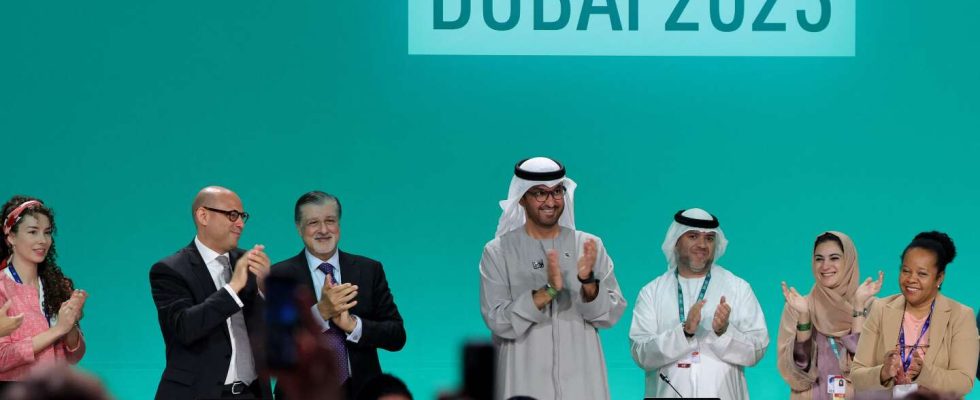An express procedure after days of hesitation and tension. Barely a few minutes after the start of a plenary meeting that had been postponed several times, Sultan Al-Jaber banged his gavel. By this gesture, the president of the 28e Climate Conference of the Parties (COP28) sealed an agreement on the Global Stocktake, the most important text of this conference. This assessment of the 2015 Paris agreement, supposed to raise the ambitions of States, includes strong words against fossil fuels, responsible for 80% of global warming. This is a decision “historic to accelerate climate action”said Sultan Al-Jaber, after a standing ovation from the room.
Before this important moment, it took a sleepless night to search for terms acceptable to delegations from around the world. Tuesday December 12, the official day of the end of COP28, Mr. Al-Jaber first lost his bet to finish on time. In Dubai, no one really believed it. Too much pressure, too many issues, too much resistance hovered between the national pavilions… Because, for the first time in the history of climate diplomacy, a UN conference took up a taboo subject, fossil fuels. The Emirati official therefore continued to postpone the publication of the final version of the Global Stocktake. Then, he consulted all night: the United States, the European Union (EU), countries like Bangladesh and, above all, the Minister of Energy of Saudi Arabia, Prince Abdulaziz Ben Salman, who arrived after midnight… essential night work to prepare the ground for this last day of plenary meetings.
In search of a thorny compromise between the most willing parties for an exit (phase out) fossil fuels in the long term (the EU, representatives of small islands, many Latin American countries) and producing countries clinging to their economic model, Sultan Al-Jaber then tried a new formula. In the “energy package” of the latest version of the text, he included “transitioning away from fossil fuels in energy systems”that is to say a “transition away from fossil fuels in energy systems”without specifying the date.
This lexical and diplomatic creativity makes it possible to do without the term “phase out”, which bristled the Gulf countries, while trying to catch up with the most ambitious. The objective of achieving carbon neutrality in 2050 is recalled. It is also a way of involving developing and emerging countries, since this development must be done in a manner “fair, orderly and equitable”that is to say at a different pace depending on the economy.
You have 75% of this article left to read. The rest is reserved for subscribers.

